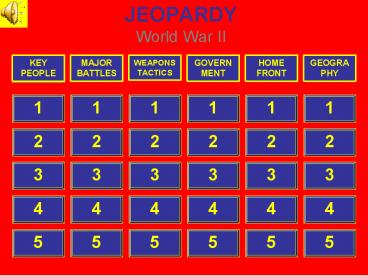KEY PEOPLE - PowerPoint PPT Presentation
1 / 31
Title:
KEY PEOPLE
Description:
A key island in the Solomon Islands that the U.S. needed to take to protect the ... The location of this island about half way across the Pacific Ocean made it a ... – PowerPoint PPT presentation
Number of Views:68
Avg rating:3.0/5.0
Title: KEY PEOPLE
1
JEOPARDY
World War II
KEY PEOPLE
MAJOR BATTLES
WEAPONS TACTICS
GOVERNMENT
HOME FRONT
GEOGRAPHY
1
1
1
1
1
1
2
2
2
2
2
2
3
3
3
3
3
3
4
4
4
4
4
4
5
5
5
5
5
5
2
President of the United States in the years
leading up to and during the War until his death
in 1944.
Franklin Delano Roosevelt
3
U.S. general that was forced to surrender the
Philippines in 1942 but upheld his promise to
return in 1944.
General Douglas MacArthur
4
Group that served in the Pacific Theater as code
talkers, by using their native language.
Navajos
5
African-American leader that threatened Negro
March on Washington to demand equal pay and
opportunities in Armed Forces in war industries.
A. Philip Randolph
6
The two generals that fought for control of
Africa in 1942, resulting in a major Allied
victory.
General Montgomery (British) General Rommel
(German)
7
Site of surprise attack by Japanese forces
against U.S. led to entrance of U.S. into World
War II.
Pearl Harbor
8
The site of the beginning of the Allied efforts
to retake mainland Europe, known as Operation
Overlord.
Normandy
9
The country attacked by Allied forces in 1943 in
an attempt to open up another front for the
Germans to defend.
Italy
10
The first Japanese city targeted by the U.S. for
the use of an atomic bomb.
Hiroshima
11
A key island in the Solomon Islands that the U.S.
needed to take to protect the lifeline between
the U.S. and Australia.
Guadalcanal
12
The weapon was used by the United States against
Japan in August of 1945 to try and avoid a land
invasion.
Atomic Bomb
13
These ships became crucial to the Pacific Theater
as they allowed aircraft to reach enemy targets
that were far from land.
Aircraft Carriers
14
The strategy that called for U.S. forces to
capture only vital islands that would allow
airbases to be built closer and closer to Japan.
Island Hopping OR Leapfrogging
15
These large planes nicknamed, Flying Fortresses,
could carry large payloads over long distances.
B-29 Bomber
16
This theater was made a priority of the United
States when they entered the war due to the need
to keep their allies in the war.
European Theater
17
Many of these programs that were created to help
the country pull out of the Depression were
eliminated as the wartime economy made them
unnecessary.
New Deal
18
The Office of Price Administration (OPA)
successfully brought this problem under control
in 1942.
Inflationary Surge
19
The government organization that imposed limits
on wage increases in many U.S. industries to keep
production costs down.
War Labor Board
20
Set up to monitor compliance with Roosevelts
executive order forbidding discrimination in
defense industries.
Fair Employment Practices Commission
21
Former Vice-president under Roosevelt that was
replaced by Truman for the 1944 election.
Henry Wallace
22
This group filled many jobs in the war industries
left vacant by soldiers and served in military in
non-combat positions.
Women
23
This was set on Americas highways to conserve
gasoline and rubber resources.
National Speed Limit
24
Drastically reduced the need for cheap labor in
the South, forcing African-American tenant
farmers and sharecroppers to the North.
Mechanical Cotton Picker
25
Ruled that the temporary suspension of civil
rights of Japanese-Americans was constitutional.
Korematsu v. U.S.
26
Mexican agricultural workers brought to the U.S.
to harvest fruit and grain crops in the West.
Braceros
27
The location of this island about half way across
the Pacific Ocean made it a vital target for both
the U.S. and Japan.
Midway
28
Russian city at which the Soviet forces were able
to stop and turn back the German invasion on the
Eastern Front.
Stalingrad
29
This island, which was taken in August of 1943,
provided Allied forces with a launching point for
an invasion of mainland Italy.
Sicily
30
The location where Roosevelt wanted to start a
diversionary front in 1942 or 1943 but was
convinced by the British to attack North Africa
instead.
France
31
Along with British Malaysia, this location was
crucial to the Japanese for its abundance of
rubber trees.
Dutch East Indies































